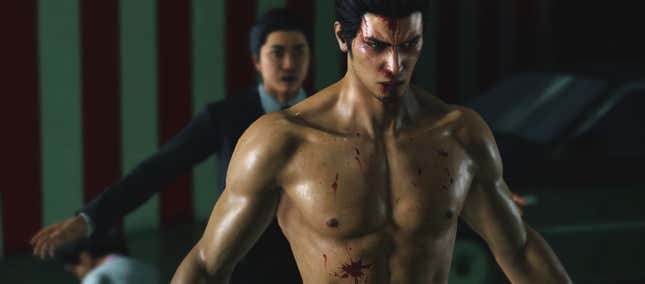I alluded to this in my review of the game, but I think it’s had enough time to sit that I’m ready to talk about it more: Yakuza 6 completely blew its ending, which considering the importance it had for the entire series is a damn shame.
Like I said last month, Yakuza 6 is a game of firsts, in that it’s the first Yakuza to be running on the new Dragon engine, which has resulted in all kinds of visual and performance improvements. But it’s also a game of lasts, because it was pitched as the final time we’d be playing as series stalwart Kazuma Kiryu in a mainline Yakuza game.

Considering the pulpy nature of Yakuza’s stories, and the fact such a big deal was made of this being Kiryu’s swansong, it was natural to expect that he was going to end up going one of two ways: either he’d ride off into the sunset, or he’d wind up dead.
Either of those outcomes would have been OK! Yakuza has always had a reluctance to kill off too many of its main characters, so this game would have been forgiven form not wanting to permanently erase its most iconic personality and give him a Geralt-esque farewell. Kiryu has been through a lot in the last 13 years, he deserves a cushy retirement.
But that’s also why killing him off would have been cool. Kiryu has had seven games in the spotlight (not counting his samurai adventures), and through that time we’ve seen pretty much every part of his backstory and personality we need to. A good death would have been a heroic way for this noble man to go out, drawing a line under his adventures and allowing for the next generation of Yakuza stars to do their thing without his shadow looming over everything to come.
Instead of choosing one of these options, Yakuza 6 tries (and fails) to cover both at the same time, leaving the end to this game—and my excitement for what comes next with this series—needlessly half-assed.
Before we go any further, if you haven’t seen the ending, or would like a recap, here it is. Just know that you’re committing to around 25 minutes of cutscene:
Yakuza 6's finale spends its opening half going all-in on the premise that Kiryu is killed. And it works. We’ve had the whole game to see him come to terms with the way the world has changed around him, while he survives as a relic of a bygone era. Yakuza 6's singular, plodding narrative seems purpose-built to clear the decks for just this moment.
So when Kiryu is gunned down after the final boss fight, it’s sad, but also weirdly appropriate. He’s sacrificed himself to save Haruka, the only person who has given him a purpose in life after the events of Yakuza 0, and if there had to be a way for Kazuma Kiryu—a man who has fought sharks—to die in battle, this was one of the few plausible ones. It would have felt off for someone to take his life, but for him to give it so as to save that of a loved one? It fits.

As he passes, Yakuza 6's finale starts to usher in a really great sense of closure. With Kiryu’s noble death, we now get to see Haruka and Haruto at peace, and there’s the sense that this is the dawn of a new era for organised crime in Sega’s universe.
I found myself on the edge of my seat. This had been a brave, memorable way to end the game, and I was loving every second of it. Sega actually did it, they weren’t kidding, this really was the last Kazuma Kiryu game, and they’d had the balls to....
Wait...BAH GAWD THATS KAZUMA KIRYUS MUSIC.
Just as we come to grips with Kiryu’s death, in a super cheap move it’s revealed that he didn’t actually die. Despite having been pumped full of lead, then left to bleed out on the floor of a remote military facility off the coast of a small town, Kiryu is very much still alive.
Or secretly alive, anyway. Assumed dead by just about everyone, Kiryu is now a free man, able to wander the streets safe in the knowledge that nobody could possibly recognise him now that he’s...got the same haircut and suit that he’s been wearing since 2005.
He hasn’t survived for nothing; it turns out Kiryu is going to be sticking around and keeping an eye on everyone, making sure the Yakuza series is OK without his brooding presence throwing bikes into people’s faces and thinking everything is rad.

“I’m not lying when I say that this is the final chapter in the legend of Kazuma Kiryu.”
Yakuza director Toshihiro Nagoshi, 2016
What a load of bullshit! I know I should have known better than to get upset at a Yakuza narrative turn, and should probably have seen such a predictable and lame twist coming from a mile off. I mean, I love Yakuza games precisely because of their daytime soap opera storylines, and if I’m ready to take the good with that tone, I should be accepting of the bad as well.
But this was just so disappointing. How often is a major video game character allowed to, let alone given a proper platform for, a final farewell? As the bullets ripped through Kiryu’s body and he slumped to the ground I’d found myself getting genuinely excited. Holy shit, I thought, they’re doing this, they’re actually going to kill him off and it’s brave and awesome and I’m going to remember this for a very long time, Rest In Peace my sweet white-shoed angel.
But nope, Sega backed out. Their intentions in bringing him back from the dead might have been to get fans pumped that he’d be sticking around and making further appearances, but I didn’t feel an ounce of excitement. I’d faced Kiryu’s death and rather enjoyed it, so his return felt more like cowardice than a comeback.

Making things even worse is that Sega pulled the same stunt twice in the one ending! Another main character, the tragic bar owner Kiyomi, is seemingly executed during the final stages of the game, only to miraculously return in the ending cutscenes. And while her comeback is far more telegraphed than Kiryu’s, the double play makes both instances more exhausting than they might have been alone.
Like the twist itself, I should have known Yakuza 6's botched ending was coming. For a series that has built its success on extraordinary brawling, zany characters and explosive money showers, Yakuza 6 constantly struggled with the sedate pace and reflective tone it was shooting for through its main storyline. To have it somehow drop all that and forge a cohesive, memorable ending was probably expecting a bit too much from the game.
It spends 60 hours wanting to immerse you in an emotional, personal journey for its longtime protagonist. But it’s hard to maintain that over the course of the storyline when you’re stopping every five minutes for some wild sidequest (involving everything from time travel to costumed dancing), and when the moments it does come together to tug at the heartstrings are undone first by a shockingly underwhelming main storyline and final villain, and then by the ending itself.
I guess it goes to show that, while some series like God of War are able to pivot from their violent pasts and explore new dramatic territory, others might be better off sticking to what they’re best at.





